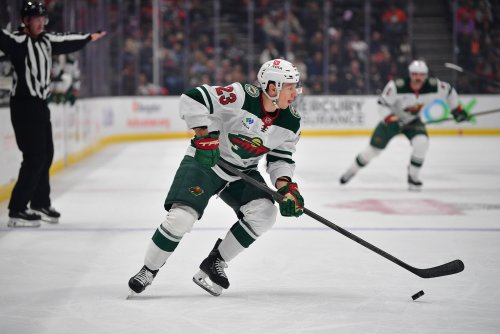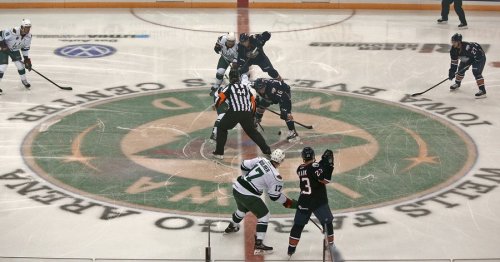
Monday on this fine website, my colleague laid out the case for why General Manager Paul Fenton’s conservative approach was the wrong move for the Wild this offseason. The piece made a lot of good points and stressed the need for the Wild to make significant changes to the roster. However, when I finished reading the piece, I couldn’t help but start forming the counter argument in my mind; what if being conservative, biding his time, and keeping his powder dry is Fenton’s best move? The Wild are a skilled team and their window of contention is still open, so why make an aggressive move unless it was a clear upgrade? All in all, Fenton’s conservative approach has left the Wild in a position to compete while still being able to add to their talent pipeline.
Player Acquisitions (Drafting and Signing)
Yes, the very first move the Wild’s new general manager made was to draft a guy that very few people had heard of and even fewer had on their shortlist of who the Wild should draft. He may not even be the best Johansson the Wild drafted that weekend. I’d like to pretend that I kept a level head and didn’t curse at the TV wishing Fenton had drafted Dominik Bokk, but I need to be honest, I did exactly that. However, I’ll be the first to admit that I am not out their scouting the players, and I rely on highlights and the analysis of others to inform my opinions of prospects (though, in all fairness, many outside analysts were also skeptical of the move) so Fenton may very well know more than I do. So rather than grade this an “F”, I’ll give Fenton the benefit of the doubt and mark it as “Incomplete”.
Where Fenton acquitted himself quite well was with re-signing players already in the organization. Fenton locked up key contributors Jason Zucker and Matt Dumba and signed Nick Seeler to a very team friendly contract. Not only are all three of those players important parts of the Wild’s future, but Fenton got an out right steal in the Seeler contract, got Zucker’s prime years for only $5.5 million AAV, and made a smart gamble to give Dumba a little more money now for it to pay off a lot in 2021 and beyond.
Fenton also made some depth moves that made a lot of fans collectively shrug. Greg Pateryn, J.T. Brown, Eric Fehr, and Matt Hendricks are not the cream of the crop, but all are trustworthy NHLers that Boudreau can trust. While some people, myself included, believe that players like Kyle Rau, Justin Kloos, and Sam Anas deserve a chance to crack the roster, I don’t think making them earn that spot is the worst thing in the world. Additionally, Fenton bought himself insurance. This is not a farm system with which he is very familiar, and it makes sense he would want some established guys ready to round out his team. Plus, if the Wild get struck with injuries (again), the added depth will be greatly appreciated.
Trades (or Lack Thereof)
After once again making the playoffs and bowing out early, the mandate was to tweak the roster and possibly change up the core in an attempt to change the dynamic to get over the hump. Fans were looking for a blockbuster, ready to say goodbye to favorites like Zucker, Coyle, or Niederreiter if it meant seeing something, anything, different. Instead, Fenton did....nothing.
I do not think this was for lack of trying. We heard the reports of the possible trade with Arizona (Zucker, Niederreiter, and Tyler Ennis for Max Domi and Christian Dvorak....yikes). If that was what the trade market was like, Fenton was right to not pull the trigger. I think Fenton was largely handicapped by No Trade / No Movement Clauses (Koivu, Parise, Suter), players coming off down/injured years so their value was low (Coyle and Niederreiter) and uncertainty of future cost/contract status (Zucker and Dumba). Again, I see Fenton making the smart move by not selling players for pennies on the dollar. Even if he does want to move some players, letting them play and giving them a chance to produce and perform does nothing to hurt their value.
Furthermore, the Wild’s prospect cupboard as-is is pretty barren (Kirill Kaprizov excluded), and a trade for a high profile player like Erik Karlsson would have meant stripping that cupboard completely bare and stealing from the future by trading draft picks all for...one season of an elite defenseman? Yes, Karlsson is an all world player, but would he re-sign here? Could the Wild afford that contract extension? Does adding Karlsson to this roster make them a Stanley Cup favorite right here right now? Unless the answer to all three questions are “yes” you are gambling the future of your team on one season. Instead, Fenton kept his picks, kept his prospects, and still has a team who has a chance to make the playoffs and from there, who knows.
Roster Turnover (Needing Elite Forwards and Prospects)
We all know the story, this is a team without elite forwards and tends to do everything by committee. That is why it cannot get over the hump. The management group should blow the team up and search for their McDavid or Eichel or Matthews.
Except...the Wild have been getting some elite production from their forwards. In 2017-18, Eric Staal tied the franchise record for goals scored (42), Zucker is an even strength scoring machine, Granlund is a playmaking wizard who you can now pencil in for 60-70 points a season, and Mikko Koivu is the best shut-down center in the league. All of this in a season in which: (1) Parise missed half a season and took another quarter of a season to get his game back; (2) Joel Erikkson Ek was a rookie and had some trouble adjusting to the NHL; (3) the Matt Cullen experience 2.0 didn’t work; and (4) Coyle and Niederreiter were non-factors due to injury. Yes the Wild do not have an all world forward, but as the Predators and Golden Knights have shown, you don’t need one to make serious noise in the playoffs.
On top of their forward group, the Wild’s defense corps produced the second most points of any defense corps in the league, just behind the Predators. That’s....pretty damn good. And the defense corps looks better this year with the stabilization of the third pair, the maturation of Dumba, and potentially a bounce back season from Brodin. The icing on the cake is Devan Dubnyk who is the rock upon which the Wild build their church. Last year he kept up his consistent play and even managed to avoid an annual slump. Furthermore, Dubnyk has shown the ability to play out of his mind for a month or two at a time. Maybe giving him some additional rest in the season could help him capture some of that mojo for the playoffs and lead his team the way Marc-Andre Fleury led Vegas.
As for acquiring more picks and prospects, this team is too good with Koivu, Parise, and Suter to truly bottom out, and the difference between a mid first round pick and a late first round pick isn’t significant, so the value added isn’t worth the losses and complete eradication of any chance to win in the playoffs now. If your team is good enough to make the playoffs, why not gamble on yourself and see what happens? Fenton can still keep his draft picks and restock the cupboard so you have more cheap, young players to join Kaprisov when he comes over.
Fenton’s Gamble
Fenton, like every general manager, is a gambler. He has chosen to gamble that the talent on this roster, with a coach like Bruce Boudreau, is good enough to make the playoffs for a seventh season. He is gambling that players coming back from injury can be effective and help further elevate this team. And this is hockey, a sport in which the eternally stuck Washington Capitals were able to break through and win the cup. A sport in which an expansion team devoid of star players was able to make it to the Stanley Cup final. It is a volatile sport, and lately that volatility has gone against the Wild. However, when looking at the assembled talent, Fenton is smart to gamble that the Wild are good enough to get themselves into a position to potentially benefit from some of that volatility.
Fenton even has some basis to believe this isn’t wild speculation (pun intended). Dom Luszczysn’s model has the Wild finishing with more points than the Blues, Stars, Blackhawks, and Avalanche and, wouldn’t ya know, that puts them third in the division and safely in a playoff spot. This despite Dom’s own admission that his model likely underrates defense first players such as Koivu, Suter, and Brodin.
What’s the downside of this gamble? Well, if it fails completely and the Wild careen out of playoff contention, he can start stripping the roster down either at the trade deadline or in the offseason. He’ll even have the added benefit of trading for futures rather than trading for help here-and-now having shown ownership and the fan base that this team has gone past the point of contention. If the Wild basically repeat last year and make the playoffs but lose early, he has gotten a year to analyze his own team, a year for some players to bounce back and increase their trade values, and nearly all of his trade pieces will still be available to him.
Compete Now Without Sacrificing the Future
I think Fenton’s approach for this year is to “compete now without sacrificing the future”. This team is actually good. They’ve proven they can put up 100 points even when faced with massive adversity. The veterans have proven they still have plenty of gas in the tank, and the young guys have shown continued improvement. The cliff where players like Staal, Dubnyk, Parise, and Suter fall off is coming, but it isn’t here yet and, in a sport as volatile as hockey, it is worth taking a chance to see if this is the season where everything clicks. It is a tall task with teams like the Jets and Predators in the division, but given the alternatives, it is the smart play. Am I being overly optimistic? Maybe, but there is enough raw talent and data backing up the idea that this team is still good enough and, the downside of the gamble is so small that it is worth taking the chance.
So sit back, enjoy the season. Watch an experienced, skilled team compete night in and night out and know that the Wild have a chance. Do this while secure in the knowledge that Fenton will be a good steward of the Wild’s draft picks and that, when the cliff comes, the landing may be softer than we all fear.
Think you could write a story like this? Hockey Wilderness wants you to develop your voice, find an audience, and we'll pay you to do it. Just fill out this form.









Recommended Comments
There are no comments to display.
Join the conversation
You can post now and register later. If you have an account, sign in now to post with your account.
Note: Your post will require moderator approval before it will be visible.